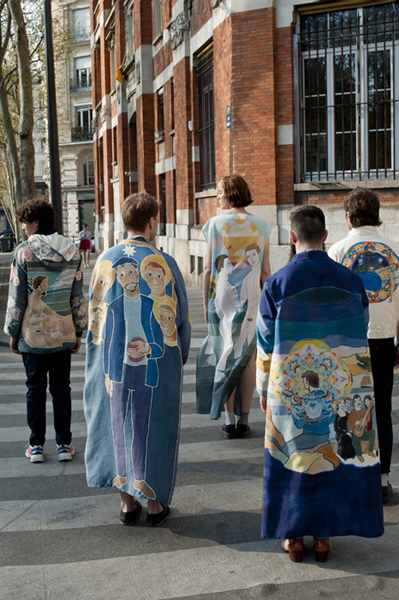Feelinger
Happening à la galerie Daniel Malingue, Paris, 2019
Performance, painted mixed fabrics,
Feelinger consists of five garments made of painted and assembled fabrics, the linings of which contain extracts from correspondence between Charles Filiger and his friends. These archives escaped destruction by his family around 1928 because of his openly assumed homosexuality. The motifs that cover them are borrowed from his pictorial vocabulary, reformulated according to extracts from these letters. These garments accentuate the permeability between the artist's work and his life in their motifs. Although praised by Antoine de la Rochefoucauld, Alfred Jarry, Joséphin Péladan, Charles Chassé and André Breton, the artist will only be presented in three exhibitions: "Filiger L'inconnu" (Strasbourg, 1989), "Charles Filiger-André Breton: à la recherche de l'art magique" (Musée des beaux-arts de Quimper, 2006), and "Charles Filiger" (Galerie Danièle Malingue, 2019).
The chosen extracts bear witness to a homosexual condition with timeless issues and sensibilities. They also explain the evolution of the artist's plastic choices. Yet his homosexuality is still relegated to a very specific modesty in 2019 in France. In the manner of a kimono, the garment becomes a pictorial support confusing the motif with the personal or collective narrative. Japan is also no stranger to Filiger, who is contemporary with the new artistic practices that this country is provoking in France. Similarly, my generation discovered the manga, which allowed for an aesthetic and political questioning on matters of gender and sexuality. This has led me since childhood to explore painting on silk and sewing. These garments are made in the domestic space using solvent-free inks that have been relegated to " craft hobbies ", echoing the coloured cardboards that Charles Filiger created without a studio nor money. These textile pieces embrace the body as an irreducible space of expression and exhibition.
They are worn with four friends on 27 March 2019 during a visit to the opening of the "Charles Filiger" exhibition at the Daniel Malingue Gallery. The exhibition brought together many works that had been scattered around, but remained discreet about the artist's homosexuality. After a few minutes, the gallery owner asked us to leave the exhibition, suggesting that we come back on another day, less crowded, and promising us that there would still be champagne left.









" He had had an adventure which almost cost him his life. He had been found dead on the pavement. "
These words of Paul-Emile Colin are reported by Charles Chassé. The latter does not hesitate to compare Filiger to Verlaine, specifying "singular stories of morals". An aggression linked to his relations led him to leave Paris and take refuge in Le Pouldu where he practised cloisonnism and synthesis.
These words of Paul-Emile Colin are reported by Charles Chassé. The latter does not hesitate to compare Filiger to Verlaine, specifying "singular stories of morals". An aggression linked to his relations led him to leave Paris and take refuge in Le Pouldu where he practised cloisonnism and synthesis.
" Gauguin took his guitar, Filiger his mandolin. Filiger played this mandolin with great feeling, but it was an almost imperceptible sound; he played for himself. "
Paul-Émile Colin perceives the melancholy and solitude of Charles Filiger, due to his homosexuality.
Paul-Émile Colin perceives the melancholy and solitude of Charles Filiger, due to his homosexuality.
" Temptation came to us (...) Something serious almost happened. “
Jan Verkade reports on an intense relationship and then on the rejection he eventually showed towards Charles Filiger. This became increasingly violent. Jan Verkade became a monk after their relationship.
Jan Verkade reports on an intense relationship and then on the rejection he eventually showed towards Charles Filiger. This became increasingly violent. Jan Verkade became a monk after their relationship.













" Drathmann's ideas perhaps tended, unbeknownst to him, to celebrate painting as a goddess who is thought of night and day, for whom, at least from time to time, one works until one is exhausted, for whom one accepts to starve, to watch and to strain, and who, in return, gives one the privilege of indulging in all sorts of disorders, real debaucheries and vilenesses concealed under the guise of righteousness, such as dealing with suicide... "
Jan Verkade witnesses Charles Filiger's addiction to ether and his suicidal thoughts.
Jan Verkade witnesses Charles Filiger's addiction to ether and his suicidal thoughts.
" My hands are afraid to touch the dream. ”
Words by Charles Filiger
Words by Charles Filiger
